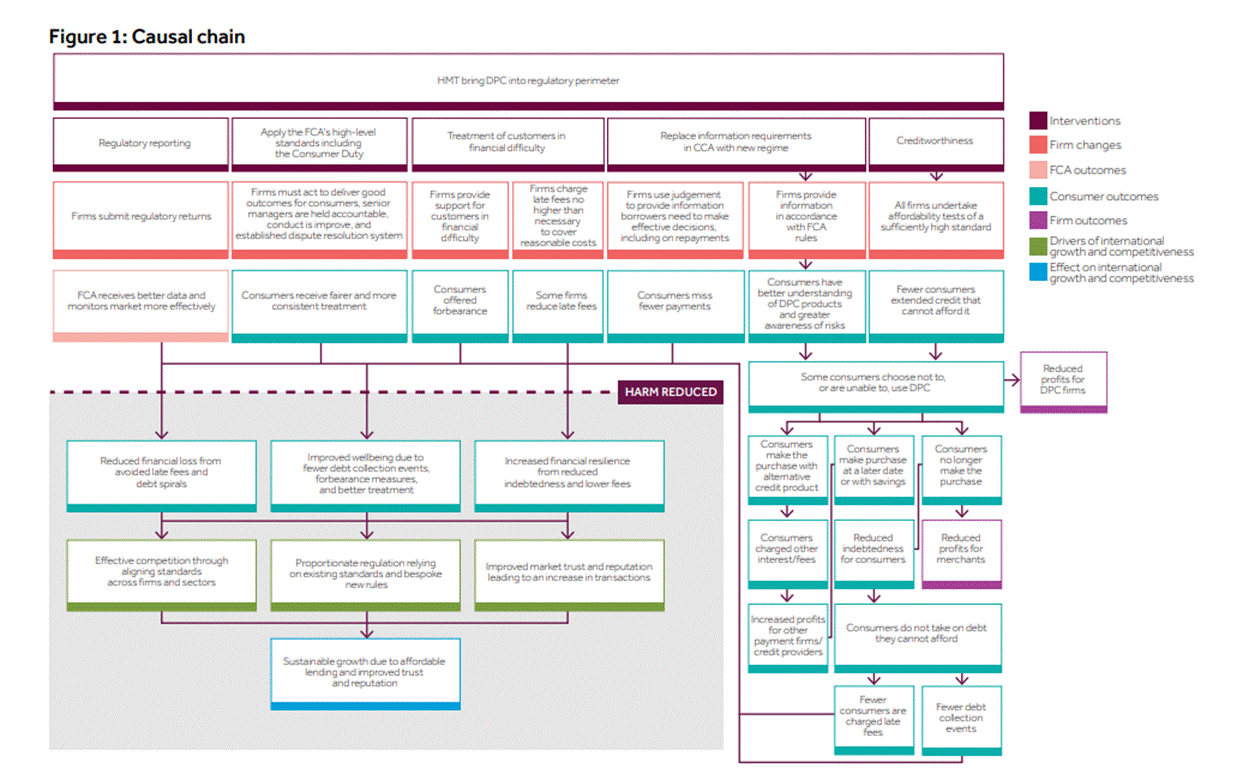FCA Consultation CP25/23: Regulating Deferred Payment Credit

This website will offer limited functionality in this browser. We only support the recent versions of major browsers like Chrome, Firefox, Safari, and Edge.

/Passle/5d9604688cb6230bac62c2d0/SearchServiceImages/2025-08-06-10-51-04-951-68933398763c43c0207a41e2.jpg)


The Financial Conduct Authority (FCA) published Consultation Paper CP25/23, setting out its proposed approach to regulating Deferred Payment Credit (DPC) also known as Buy Now Pay Later (BNPL), a form of interest-free credit repayable in 12 or fewer instalments within 12 months. DPC is currently exempt from regulation, however following the growth in DPC lending to over £13bn in 2024 and with 20% of UK consumers using DPC in the 12 months leading up to May 2024, legislation was passed on 14 July 2025 to bring DPC lending under FCA regulation. This consultation paper sets out the FCA's proposals with the regulations planned to go live on 15 July 2026.
We consider below a few of the key proposals and the impact regulation may have on firms.
Consumer Duty
CP25/23 intrinsically links the new proposed regulations to the Consumer Duty requiring firms to deliver their obligations under the Duty. Included is a flowchart setting out the outcomes the FCA want to achieve by regulating DPC with a focus on harm reduction for the consumer. Such as by reducing financial loss, improving wellbeing and increasing financial resilience. This is to be achieved by consumers having access to information to better understand their rights and obligations as well as any risks of entering into DPC agreements.

Provision of Information Requirements
The proposal confirms there is no intention to apply a full Consumer Credit Act (CCA) disclosure regime and instead to create a proportionate regime for DPC. This will include a requirement for DPC lenders to disclose key product information before a consumer enters a DPC arrangement and requirements regarding communications for consumers who have missed repayments. However, the FCA does not propose to implement any rules on the form and content of the DPC agreement itself.
The key product information would include details such as the rate of interest, amount of credit, payment details, consequences of missing payments and credit searches details if carried out.
In relation to a consumer that has missed a repayment, the proposed rules would require a firm to communicate as soon as possible after a consumer has failed to make a repayment and to provide the consumer with reasonable notice before taking steps to terminate or enforce a term of the agreement. The rules will not however specify the medium of how these communications are to be made.
These proposed rules are to ensure that consumers have an understanding of the agreements and are alerted when a situation occurs that could harm their financial situation.
Affordability and Creditworthiness
A key proposal is the application of creditworthiness and affordability assessments under the Consumer Credit sourcebook (CONC). Lenders will need to assess whether DPC is affordable for the consumer, considering their financial situation and potential risks in line with CONC 5.2A which will not be amended for DPC agreements.
Dispute Resolution
The FCA proposes that the Dispute resolution: Complaints' sourcebook (DISP) will apply to all DPC lenders within the regulatory perimeter, covering how firms are to handle complaints. The FCA is therefore proposing that DPC agreements should fall within the compulsory jurisdiction of the Financial Ombudsman Service (FOS). This would allow consumers to escalate complaints about DPC products to the FOS, ensuring access to independent dispute resolution. The inclusion of DPC within FOS jurisdiction aligns with broader consumer protection goals and mirrors the treatment of other regulated credit agreements.
Transitional Period
The FCA acknowledges the need for a transitional period to allow firms to prepare for the new regulatory framework. There is a proposed temporary permissions regime (TPR) allowing firms who do not currently hold the necessary consumer credit permissions to continue to operate whilst the FCA determines their applications for authorisation. Firms intending to enter the TPR will have to notify the FCA before 15 July 2026 (Regulation Day).
Looking ahead
The FCA’s CP25/23 consultation represents a significant step towards regulating the fast-growing DPC market. Stakeholders are encouraged to respond with any feedback by 26 September 2025. Final rules are expected in early 2026, with implementation from 15 July 2026. With less than a year until Regulation Day firms which are in the DPC space will need to start preparing for the implementation of these regulations. This will include considering preparing for FCA authorisation if required, updating disclosures to comply with the provision of information requirements, considering the application of CONC 5.2A in assessing creditworthiness and updating other policies and processes to meet the complaints requirements and data reporting obligations.
If you would like to discuss how these future regulations may impact your firm, please contact Matt Jones . You can meet our financial services experts here.
In line with our Strategy, our approach seeks to help consumers navigate their financial lives whilst supporting sustained economic growth. Our proposals aim to ensure that DPC borrowers get the right information, in the right way and at the right time, which helps them to make good decisions. We want DPC lending to be affordable, and to make sure firms give borrowers in financial difficulty appropriate support. We also want to be proportionate, relying on the Consumer Duty (the Duty) where possible, rather than introducing new rules. We also don’t want to impose undue burdens on DPC business models
Want more Burges Salmon content? Add us as a preferred source on Google to your favourites list for content and news you can trust.
Update your preferred sourcesBe sure to follow us on LinkedIn and stay up to date with all the latest from Burges Salmon.
Follow us